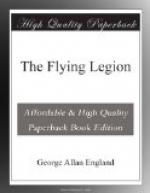The Celt’s eyes were alight with swift, eager enthusiasm. He laid his hand on the other’s, and gripped it hard in hot anticipation.
“Tell me more!” he commanded. “What are we going to do?”
“Going to see the stuff that’s in us, and in twenty-five or thirty more of our kind. The stuff, the backbone, the heart that’s in you, Bohannan! That’s in me! In all of us!”
“Great, great! That’s me!” Bohannan’s cigarette smoldered, unheeded, in his fingers. The soul of him was thrilling with great visions. “I’m with you! Whither bound?”
The Master smiled oddly, as he answered in a low, even tone:
“To Paradise—or Hell!”
CHAPTER III
THE GATHERING OF THE LEGIONARIES
One week from that night, twenty-seven other men assembled in the strange eyrie of Niss’rosh, nearly a thousand feet above the city’s turmoil. They came singly or in pairs, their arrival spaced in such a manner as not to make the gathering obvious to anyone in the building below.
Rrisa, the silent and discreet, brought them up in the private elevator from the forty-first floor to the Master’s apartment on the top story of the building, then up the stairway to the observatory, and thus ushered them into the presence of the Master and Bohannan. Each man was personally known to one or the other, who vouched absolutely for his secrecy, valor, and good faith.
This story would resolve itself into a catalogue were each man to be named, with his title, his war-exploits, his decorations. We shall have to touch but lightly on this matter of personnel. Six of the men were Americans—eight, including the Master and Bohannan; four English; five French; two Serbian; three Italian; and the others represented New Zealand, Canada, Russia, Cuba, Poland, Montenegro, and Japan.
Not one of these men but bore a wound or more, from the Great Conflict. This matter of having a scar had been made one prime requisite for admission to the Legion. Each had anywhere from one to half a dozen decorations, whether the Congressional Medal, the V.C., the Croix de Guerre, the Order of the Rising Sun, or what-not.
Not one was in uniform. That would have made their arrival far too conspicuous. Dressed as they were, in mufti, even had anyone noted their coming, it could not have been interpreted as anything but an ordinary social affair.
Twenty-nine men, all told, gathered in the observatory, clearly illuminated by the hidden lights. All were true blue, all loyal to the core, all rusting with ennui, all drawn thither by the lure of the word that had been passed them in club and office, on the golf links, in the street. All had been pledged, whether they went further or not, to keep this matter secret as the grave.
Some were already known to each other. Some needed introduction. Such introduction consumed a few minutes, even after the last had come and been checked off on the Master’s list, in cipher code. The brightly lighted room, behind its impenetrable curtains, blued with tobacco-smoke; but no drop of wine or spirits was visible.




